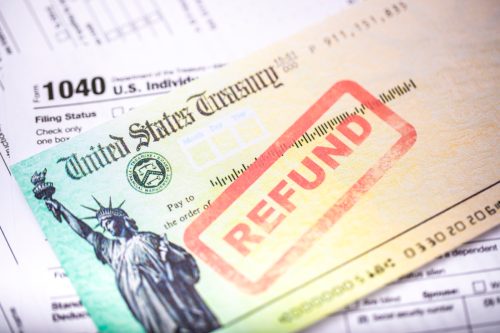The IRS Warns You Must Do This by April 18—And It’s Not This Year’s Taxes

The stress of the 2022 tax season is piling up, as taxpayers now have less than a month to get their return submitted and pay any taxes they owe. The filing deadline for this year is April 18, but you may want to commit this date to memory even if you’ve already gotten your taxes done this year. The Internal Revenue Service (IRS) recently sent out a new warning, advising taxpayers that they have another obligation due by this date that doesn’t have to do with this year’s return. Read on to find out what else you might need to do before April 18.
RELATED: The IRS Just Cautioned Taxpayers Against Doing This.
The IRS says there are billions in unclaimed refunds from 2018.

If you didn’t file a 2018 tax return and claim the refund money you are legally owed by the IRS, you’re not alone. On March 25, the agency released a new notice warning taxpayers that there is nearly $1.5 billion dollars in unclaimed income tax refunds from that year. According to the IRS, this is the result of an estimated 1.5 million taxpayers not filing a return in 2018. But if you are one of the million, the agency confirmed in its warning that you can still file and receive your refund from that year.
You must claim your 2018 refund this year to receive it if you haven’t already.

To claim your refund money from 2018, you must file a tax return for that year—but you only have until April 18 to do so. According to the IRS, the law provides most taxpayers a three-year window to file a tax return after the deadline and still claim their refund. After that, the money becomes the property of the U.S. Treasury.
“The IRS wants to help people who are due refunds but haven’t filed their 2018 tax returns yet,” IRS Commissioner Chuck Rettig said in a statement. “But people need to act quickly. By law, there’s only a three-year window to claim these refunds, which closes with this year’s April tax deadline. We want to help people get these refunds, but they need to file a 2018 tax return before this critical deadline.”
The final 2018 tax return window for most taxpayers is April 18, in line with the 2022 tax deadline. The only exception is for those in Maine and Massachusetts, who have until April 19 due to the Patriot’s Day holiday in both states. The agency warns that by law, you must “properly address, mail and ensure [your] tax return is postmarked” by your respective due date.
RELATED: For more financial advice delivered straight to your inbox, sign up for our daily newsletter.
Your refund amount will depend on a number of factors.

According to the new warning, the IRS said it estimates that the midpoint for potential 2018 refunds is $813. “That is, half of the refunds are more than $813 and half are less,” the agency explained. Certain states are estimated to have a larger total amount of potential refunds from that year, like California, Texas, and Florida.
And your refund could also be worth more than you expect because “many low- and moderate-income workers may be eligible for the Earned Income Tax Credit (EITC)” alongside their normal refund of taxes withheld or paid that year, the IRS said. According to the agency, the EITC is available to individuals and families whose incomes fall below certain thresholds, and in 2018, the credit was worth up to $6,431.
Your refund could also fall on the smaller end of the spectrum if you owe money to the government in any way. “The refund will be applied to any amounts still owed to the IRS or a state tax agency and may be used to offset unpaid child support or past due federal debts, such as student loans,” the agency warned.
Filing your return can also help you reduce penalties and fees.

When you don’t file and pay your taxes on time, the IRS can and usually will start charging you late penalties and interest fees. But even if you can’t pay the tax liability you owe for late returns in full, the agency recommends that you file all tax returns that are due as soon as possible. “File your past due return the same way that you would file an on-time return,” the IRS advised. “If you have a balance due, filing your past due return now and paying your tax liability can limit interest and late payment penalties.”
The IRS also warned that if you file a return looking to claim a 2018 tax refund this year, it might be held if you have not filed your returns for 2019 or 2020 either. And not filing tax returns if you are required to can hurt you in other areas of your life as well. “Because copies of filed tax returns are usually required by financial institutions to secure loans, mortgages, and other financial benefits such as federal assistance for higher education, you may be ineligible or face delays if you’re not current with your tax returns,” the IRS said.
RELATED: The IRS Now Won’t Let You Do This Until After April 18.